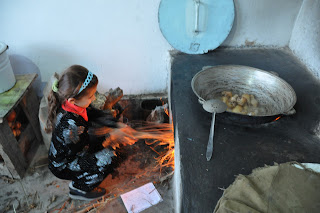In Tajikistan it's common to have fresh milk available, many families have their own cow that they milk daily. It's a treat, especially when your lucky enough to be offered the fresh cream!
Sometimes our office cook, Venera, brings me a mug of fresh milk in the morning. So, when my co-worker asked me if I wanted some milk this weekend, of course I said I'd like a little.
Ali-jon: Would you like some fresh milk?
Me: Thank you, I'll have a little.
Ali-jon (in English- he knows a few words and always tries to speak to me in English): I have small dogs.
My internal thoughts: His translation must be wrong, I'll clarify in Tajik
Me (in Tajik): Dogs, the milk is from a dog?
Ali-jon (in Tajik): Dog, yes. Only two puppies are alive, the others died. (He mimes milking) We have gotten a lot of milk, 5 liters.
This was a first for me. I reflected on why my internal response was not one of excitement. I drink cow milk, I drink goat milk, why wouldn't I drink dog milk? I drank a little and surprisingly it tasted just like milk, but maybe a little more like skim milk than whole milk.
Sometimes our office cook, Venera, brings me a mug of fresh milk in the morning. So, when my co-worker asked me if I wanted some milk this weekend, of course I said I'd like a little.
Ali-jon: Would you like some fresh milk?
Me: Thank you, I'll have a little.
Ali-jon (in English- he knows a few words and always tries to speak to me in English): I have small dogs.
My internal thoughts: His translation must be wrong, I'll clarify in Tajik
Me (in Tajik): Dogs, the milk is from a dog?
Ali-jon (in Tajik): Dog, yes. Only two puppies are alive, the others died. (He mimes milking) We have gotten a lot of milk, 5 liters.
This was a first for me. I reflected on why my internal response was not one of excitement. I drink cow milk, I drink goat milk, why wouldn't I drink dog milk? I drank a little and surprisingly it tasted just like milk, but maybe a little more like skim milk than whole milk.


